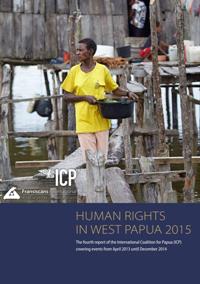
Solomon Islands speaks at UN Human Rights Council on West Papua
The United Nations' Human Rights Council in Geneva held its 31st regular session from the 29th of February to the 24th of March 2016.
On March 15th 2016 Solomon Islands raised concern on the ongoing human rights violations in West Papua during the council's session. The representative of the Solomon Islands particularly referred to frequently reported cases ofÂÂ arbitrary arrests, summary executions, tortures, ill treatment and limitations of freedom of expression committed by Indonesian security forces. Minister Counsellor and Chargé d’Affaires of the Solomon Islands Mission to the United Nations and the WTO in Geneva, Barrett Salato told the Council on Monday, that human rights violations in that region needs urgent attention by the world community. Salato also highlighted the high number of maternal mortality of 500 per 100’000 stressing that access to education and health services for the Papuans has deteriorated.
Find the statement and the reply by Indonesia here
_
Indonesian Government criticised for handling of separatist movement
Members of Commission I of the Indonesian House of Representatives criticized the government during a public hearing for their lacking initiative in handling the independence movement of West Papua. Commission I is responsible for Defense and foreign affairs. According to members of Commission I the government, in particular the foreign ministry, has failed in setting up a unified approach against the human rights based international campaign for independence, which would slowly but surely gained ground in foreign countries all over the world.
Read more
_
Institute for Policy Analysis of Conflict update report on the Indonesian military's influence
The Indonesian military (Tentara Nasional Indonesia, TNI) in 2016 may intensify pressure for a broader remit in internal security affairs as its warm relationship with President Jokowi deepens and its credibility with the public soars. Several factors continue to drive the push for power: conviction that the country is facing many dangers that only the TNI can address; distrust of civilian politicians and political leaders; resentment of the police; and a sense of opportunity in the current political situation.
Read more and find the full report here
_
Indonesia's forgotten political prisoners
by Andreas Harsono
Johan Teterisa went from school teacher to political prisoner on June 29, 2007. On that day, he led a group of 27 Moluccan independence activists to join in the annual Family Day festivities at Merdeka Stadium in Ambon, the capital of Maluku province. The activists scandalized then-President Susilo Bambang Yudhoyono, who was in the audience with a group of foreign diplomats, by performing the Moluccan cakalele traditional war dance and unfurling the officially banned Republic of South Maluku (RMS) flag.
Read more
_
About the ICP
Human Rights and Peace for Papua is an international coalition of faith-based and civil society organisations (the Coalition) addressing the serious human rights condition in West Papua and supporting a peaceful solution to the conflict there. West Papua (Papua) refers to the western half of the New Guinea island in the Pacific and comprises the eastern most provinces of Indonesia. Indigenous Papuans are suffering from a long and ongoing history of human rights violations and security forces subject them to violence including killings, torture and arbitrary arrests. Impunity prevails. A lack of adequate access to health care and education as well as demographical and economical marginalisation and discrimination mark the living condition for Papuans. A heavy presence of Indonesian security forces, lack of access for international observers such as journalists, corruption and transmigration from other parts of Indonesia aggravate the situation. Political prisoners and the persecution of political activists shows the extent of repression with which freedom of expression and indigenous peoples’ rights are being violated. Papua’s wealth in natural resources attracts businesses and security forces resulting in exploitation through mining, logging, harmful agricultural projects, and environmental degradation. This dynamic challenges traditional indigenous culture while Papuans demand their right to self-determination.
_
visit our website at www.humanrightspapua.org
Our mailing address is:
International Coalition for Papua
Rudolfstraße 137
Wuppertal 42285
Germany
